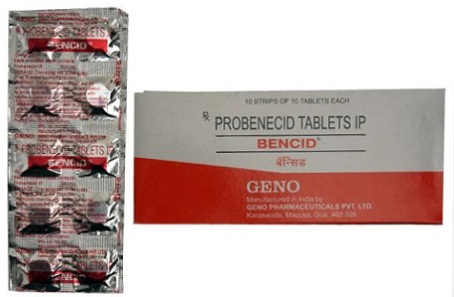Probenecid Shows Promise Against Respiratory Virus: Human Metapneumovirus (HMPV)
Nikhil Prasad Fact checked by:Thailand Medical News Team Jul 07, 2024 1 year, 6 months, 4 weeks, 1 day, 1 hour, 28 minutes ago
Med News: Human Metapneumovirus (HMPV) is a major cause of respiratory infections, especially in young children, the elderly, and those with weakened immune systems. Despite its significant impact, there is currently no specific antiviral treatment or vaccine available for HMPV. This has left doctors with limited options, primarily focusing on supportive care to manage symptoms. However, a recent study that is covered in this
Med News report, has uncovered a potential game-changer: an old drug called probenecid.
 Probenecid Shows Promise Against Respiratory Virus: Human Metapneumovirus (HMPV)
What is HMPV?
Probenecid Shows Promise Against Respiratory Virus: Human Metapneumovirus (HMPV)
What is HMPV?
HMPV is a virus that belongs to the Pneumoviridae family. It's similar to other respiratory viruses like the flu, RSV (respiratory syncytial virus), and common coronaviruses. HMPV can cause symptoms ranging from mild cold-like symptoms to severe respiratory issues such as pneumonia and bronchiolitis, particularly in young children and the elderly.
The Study and Its Findings
Researchers from the University of Georgia-USA and TrippBio, Inc.-USA explored the effects of probenecid on HMPV. Probenecid, a drug traditionally used to treat gout by lowering uric acid levels, has shown potential antiviral properties in recent studies. This study investigated whether probenecid could inhibit HMPV replication both in cell cultures and in mice.
Probenecid in Cell Cultures
The research team first tested probenecid on HMPV-infected LLC-MK2 cells (a type of monkey kidney cell line used in virus research). They found that pre-treating the cells with probenecid significantly reduced the replication of the virus. Even when the drug was administered after infection, it still managed to inhibit virus replication effectively. These results are promising, suggesting that probenecid could potentially be used both as a preventive measure and a treatment.
Probenecid in Mice
To further confirm their findings, the researchers conducted experiments on BALB/c mice, a standard model for studying respiratory infections. The mice were treated with different doses of probenecid either before or after being infected with HMPV. The results were consistent with the cell culture experiments: probenecid significantly reduced the viral load in the lungs of the infected mice.
Why Probenecid?
Probenecid is not a new drug. It has been safely used for decades to treat gout, which means its safety profile is well-established. This could potentially speed up the process of repurposing it for use against HMPV. Moreover, probenecid has shown broad-spectrum antiviral activity in previous studies, effectively inhibiting viruses like RSV, influenza, and even SARS-CoV-2 (the virus causing COVID-19).
How Does It Work?
The exact mechanism by which probenecid inhibits viral replication is still being studied. However, it is believed to involve the inhibition of specific cellular pathways that viruses exploit to replicate. By blocking these
pathways, probenecid can effectively prevent the virus from multiplying.
The Bigger Picture
The discovery that probenecid can inhibit HMPV replication is a significant step forward in the fight against respiratory infections. While further studies and clinical trials are needed to confirm its efficacy and safety in humans, the potential benefits are substantial. If successful, probenecid could offer a much-needed treatment option for those affected by HMPV, reducing the burden on healthcare systems and improving patient outcomes.
Future Directions
The researchers are optimistic about the potential of probenecid and plan to conduct more studies to better understand its antiviral mechanisms and efficacy in different settings. They are also exploring its effects on other respiratory viruses, hoping to develop a broad-spectrum antiviral therapy.
Conclusion
The fight against respiratory viruses like HMPV is ongoing, and the discovery of probenecid's antiviral properties offers new hope. This well-known, safe drug could potentially be repurposed to treat a variety of viral infections, providing a valuable tool in our medical arsenal. As research continues, the medical community eagerly awaits the results, hoping to add another weapon against the ever-present threat of respiratory viruses.
The study findings were published in the peer reviewed journal: Viruses
https://www.mdpi.com/1999-4915/16/7/1087
For the latest
Med News, keep on logging to Thailand Medical News.
Read Also:
https://www.thailandmedical.news/news/herbs-and-phytochemicals-fermented-codonopsis-lanceolata-root-extract-shows-promise-against-influenza-a-virus
https://www.thailandmedical.news/news/herbs-and-phytochemicals-fermented-codonopsis-lanceolata-root-extract-shows-promise-against-influenza-a-virus
